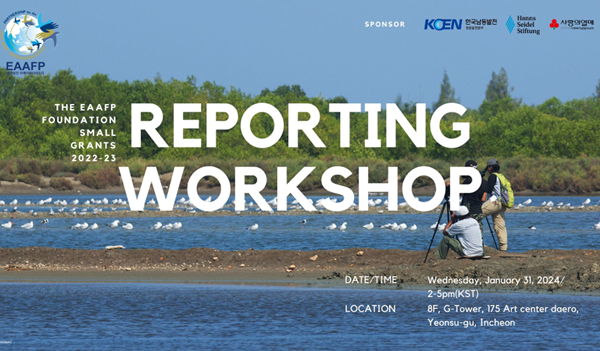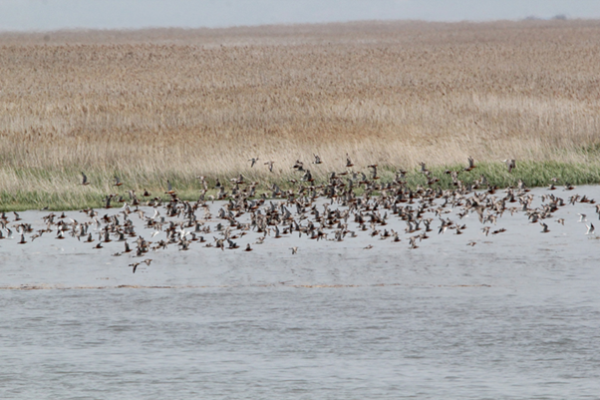The 11th International Association of Ecology (INTECOL) International Wetland Conference held from 10-15 October 2021 was hosted in Christchurch, New Zealand. The 11th INTECOL focuses on ‘traditional knowledge & innovative science in wetland research & management’ to promote and increase awareness on traditional ecological knowledge, which will support integrating traditional knowledge into western science, recognizing the importance of world wetlands for local populations.
![]()
The concurrent 1a session held on Day 1 focused on ‘sharing knowledge, science, and management lesson of wetlands across boundaries – From Alaska, via Northeast to New Zealand.’ The Symposium invited 6 speakers, to share their insights and experience for the conservation and wise use of wetlands along the East Asian-Australasian Flyway (EAAF). Hence, the session captured each of the speakers’ ecological interests and knowledge for Northeast Asia with special focus on the Yellow Sea region and DPRK. Professor Changwoo Ahn, George Mason University, the co-organizer opened the symposium highlighting collaboration along the East Asian-Australasian Flyway (EAAF) through strong interaction with participants from the Flyway from United States (USA), Republic of Korea (ROK) and down south to New Zealand (NZ).
Next, Mr. Felix Glenk from Hanns Seidel Foundation (HSF) Korea, the co-organizer of the symposium shared Democratic People’s Republic of Korea (DPRK) and developments for wetland conservation, acknowledging the strong efforts made in DPRK. Mr. Glenk shared some key activities in DPRK, such as video production that brought wetland conservation into context for the general audience; the video can be viewed here. Hence, DPRK’s close cooperation with HSF and Ministry of Land and Environment Protection since 2015 has led to important outcomes such as international, national, and local workshops, biodiversity surveys in potential Ramsar Sites, and study tours. Moreover, it has enhanced networks, awareness raising and produced a national wetlands inventory including more than 50 important wetlands in DPRK. He shared that trust-building through environment cooperation, integrated international environmental networks, and exchange in transboundary issues in the Korean peninsula is key to continue this momentum in wise use wetland conservation in DPRK.
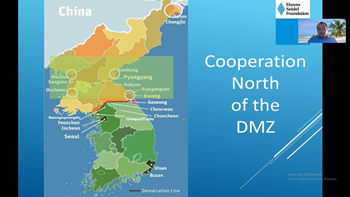 Mr. Felix Glenk presentation ©EAAFP Secretariat
Mr. Felix Glenk presentation ©EAAFP Secretariat
Next Mr. Spike Millington from International Crane Foundation, highlighted the need to take a ‘whole-of-flyway conservation approach’ to safeguard endangered cranes species along the EAAF. He started off with a crucial question, ‘how to introduce best wetland management practices at key sites’ as the network of sites have different and dynamic conditions to ensure it is in best condition for the cranes. Especially for critically endangered Siberian Cranes, , as they migrate south in northeast China, the rapidly changing environment in their habitat highlights the importance for people to manage land and waterflow. Hence, to ensure the land and waterflow are well managed he highlighted that all stakeholders including local farmers need to work together. Mr. Millington concluded that its crucial in thinking how wetlands should be managed at all stages in the lifecycle which can be learned through other countries case studies along the migratory Flyway.
Mr. Raphael Glement from IUCN Asia, further covered the Yellow/West Sea Working Group (YSWG) as the basis of establishing a regional platform for transboundary cooperation. The Yellow/West Sea, one of the largest areas of intertidal flats, supported by IUCN Resolution 026 to enhance cooperation among the Yellow/West Sea countries, established a joint working group with DPRK, People of Republic China (PRC) and ROK. The YSWG aims to facilitate international cooperation for the conservation and sustainable use of the Yellow/West Sea. Mr. Glement shared several activities initiated such as the workplan 2020-2022, update on 2012 IUCN report focused particular on Yellow/West and its role as a key platform to prepare for the second phases of the World Heritage nomination. The presentation concluded that as YSWG prioritizes to identify science, and work as a platform to harmonize approaches globally, strong challenges remain as an informal platform to ensure strong transboundary cooperation and DPRK participation is secured.
Ms. Hyeseon Do from EAAFP Secretariat continued the importance of the dialogue of the interlinkage of Yellow/West Sea and the East Asian-Australasian Flyway Partnership (EAAFP), highlighting the importance of cooperation from the international, national and site level, and to ensure dialogues are based on scientific knowledge. Ms. Do highlighted that the next steps to move forward: First, to link conservation works with the ongoing global agenda; Second, to identify additional areas for conservation sustainable management particularly the Yellow/West Sea which can be initiated through sharing more scientific knowledge-based resources across countries along the Flyway; and lastly, to increase more cooperation in different sectors such as joint survey for key species, wetland education and awareness-raising, and capacity building.
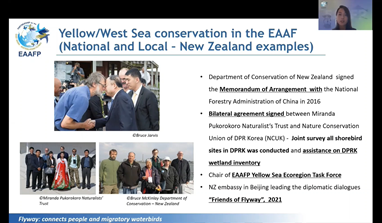 Ms. Hyeseon Do presentation ©EAAFP Secretariat
Ms. Hyeseon Do presentation ©EAAFP Secretariat
The last presentation was by Mr. David Melville from Global Flyway Partnership. He shared the story of Bar-tailed Godwits, the long distant migrant, along the EAAF and its threats imposed due to coastal loss and degradation such as Yalujiang National Nature Reserve Dandong Port changing the waterflow due to port development and Saemangeum, ROK undertaking world’s largest land claim project. Other impacts were incidental morality due to hunting, alien weed spread of Spartina invasion, pesticide use for commercial agriculture, climate change and sea level rise. Mr. Melville shared examples of governments action in addressing coastal wetland conservation with DPRK producing a national wetland inventory, ROK including coastal restoration in 2020 Green New Deal, and China 14th 5-year plan for coastal protection and restoration. Moreover, he shared Asian Development Bank (ADB) Regional Flyway Initiative in mobilizing 3 billion dollars for wetland protection and sustainable management. He encouraged the possibility of future trilateral World Heritage nomination and highlighted the importance of sound science to support conservation action and decision-making process.
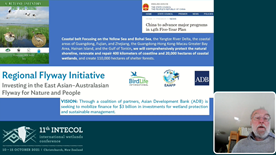 Mr. David Melville presentation ©EAAFP Secretariat
Mr. David Melville presentation ©EAAFP Secretariat
Overall, the Symposium successfully concluded with strong points made to better science communication with more effective broader impact activities for wetland conservation globally. Each speakers’ shared knowledge and experience enhanced integrated efforts to strengthen the capacity for conversation and the wise use of wetlands along the EAAF.
“It was a pleasure to attend the Symposium focusing on the Yellow Sea at the recent INTECOL International Wetland Conference. The six presentations highlighted the extent of the work being undertaken in the Yellow Sea to protect migratory waterbird habitats and populations. The work of the EAAFP Secretariat and Partners was a central theme of all the presentations that also highlighted the priorities for future cooperation and work on the ground to protect these very important parts of the flyway” concluded Mr. Bruce McKinlay, New Zealand Government Focal Point to EAAFP and Chair of EAAFP Yellow Sea Task Force.
If you want to share research paper/article, please reach out to EAAFP Secretariat.
Examples mentioned in the presentations:
Saving a flyway video: (16) Saving a Flyway_Short version (Eng) – YouTube
https://www.eaaflyway.net/world-migratory-bird-day-2021/

